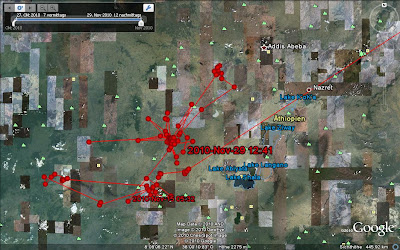
After its long stop over, Sheba is slowly proceeding south anew whereas Sindbad has returned to its former location.
 Let's see whether these movements indicate pre-migratory activity, and they will soon proceed on their trip to Madagascar...
Let's see whether these movements indicate pre-migratory activity, and they will soon proceed on their trip to Madagascar...
 Since 24 November Sinbad has travelled 140km north and is now staying at an altitude of ca 2,100 meters! The last location was of very high data quality (LC3) so we can be sure that the bird is now 60 km southwest of Addis Ababa.
Since 24 November Sinbad has travelled 140km north and is now staying at an altitude of ca 2,100 meters! The last location was of very high data quality (LC3) so we can be sure that the bird is now 60 km southwest of Addis Ababa. Sinbad is still staying in the highlands of Ethiopia at an altitude of 1,400 meters. He hasn't moved much, but data quality is high so the bird is well exposed to sunlight (and thus probably in the air quite often). Sheba is in Chad and has moved a little farther southwest. She is approaching the border of the Central African Republic, but takes it slow.
Sinbad is still staying in the highlands of Ethiopia at an altitude of 1,400 meters. He hasn't moved much, but data quality is high so the bird is well exposed to sunlight (and thus probably in the air quite often). Sheba is in Chad and has moved a little farther southwest. She is approaching the border of the Central African Republic, but takes it slow. Here 'our' falcons go again! Sheba is migrating further west into Chad and Sinbad has arrived in Ethiopia. Sinbad is staying in places between 1,600 and 2,100 m in altitude at the moment! According to my and the Greek study, Eleonora's falcon do stop over in this region during their spring migration (for about 7 days). Obviously this high plateau must be very rich in insects at least in spring. Has anybody been there before who can tell us what this high plateau looks like?
Here 'our' falcons go again! Sheba is migrating further west into Chad and Sinbad has arrived in Ethiopia. Sinbad is staying in places between 1,600 and 2,100 m in altitude at the moment! According to my and the Greek study, Eleonora's falcon do stop over in this region during their spring migration (for about 7 days). Obviously this high plateau must be very rich in insects at least in spring. Has anybody been there before who can tell us what this high plateau looks like?
